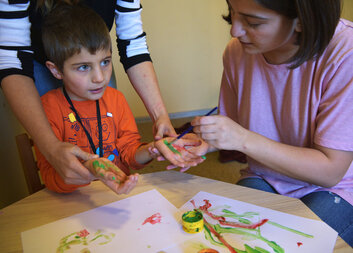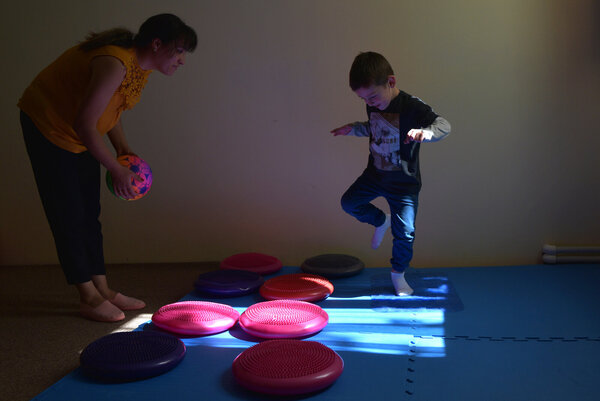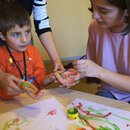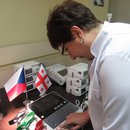As every year, Caritas Czech Republic joins the World Autism Awareness Day, marked on April 2. It is great opportunity not only to celebrate the unique talents of the persons with autism and to spotlight the problems these people face every day, but also to recall all of accomplishment Czech Caritas has made in improving services for persons with autistic spectrum disorder (ASD) in Georgia during last five years.
Caritas advocates for better services for people with autism
Thanks to the Czech Development Agency, Caritas Czech Republic supports the development of services for persons with ASD on several levels: on the national level, we introduced a state protocol for the identification, diagnosis and management of autism disorder in Georgia and created autism service standards, which were approved by the Ministry of Health, and which now serve as the guideline for all service providers assuring quality of the service each child with ASD should receive. The protocol was approved and already introduced in eight regions of Georgia out of ten.
On municipal level, CCR has been advocating for creation of municipal programs for children with ASD and such programs were already approved in Rustavi, Akhaltsikhe and Ozurgeti municipalities. Our team has also been working closely with service providing organizations in those municipalities, which we equipped with suitable toys and diagnostic tools, and for whose staff we provided professional development trainings.
"Thanks to our targeted interventions, around 10-15 children with ASD benefit from improved services per year.” Project manager in Caritas Czech Republic, Rusudan Chkhubianishvili, said.
Caritas trained nearly 1000 professionals
Considerable progress has been made in the early identification and diagnosis of autism in children in most regions of Georgia: Kakheti, Imereti, Samegrelo, Adjara, Guria, Samtskhe-Javakheti, Racha-Lechkhumi-Kvemo Svaneti regions. There, we trained 622 doctors and 160 autism specialists trained in early identification and management of ASD during last five years.
Even more has been achieved in improving the quality of Applied Behavior Analysis (ABA). In partnership with the Institute of Child Development of Ilia State University, the capacities of local service providers in conducting ABA therapy were increased and subsequent supervision was provided. In total, 214 behaviour therapists from all over Georgia participated in various professional trainings and seven regional service providers benefited from CCR´s support.
Special groups in kindergartens
Thanks to funding from Czech Development Agency, CCR contributed to the integration of autistic children to regular educational institutions. With our support, three inclusive groups were opened for children with ASD in Tbilisi, Telavi and Zugdidi. All staff of all three pilot kindergartens were trained in the main principles of inclusive education.
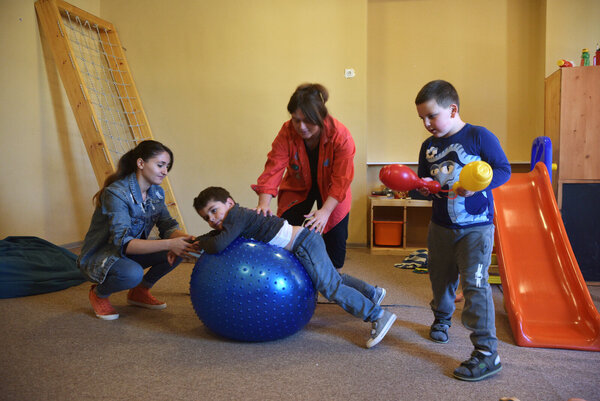
„It’s been about the second year since we’ve been coming to the autism center. Initially, my child was very aggressive, and it was very difficult to deal with him, I did not know what he wanted. In about six months, we had a good result and now my child behaves without major problems. He understands absolutely all instructions and it has become easier to communicate with him. I am very glad that we are involved in the integrated kindergarten group. Caritas Czech Republic has made a great contribution to my son’s progress. CCR funded both our therapy sessions at the Autism Center, as well as at integrated group at the 7th Kindergarten of Telavi,” said Natia Sosielia, mother of a child with autism spectrum disorder.
Join us, Natia, her son, and other children with ASD and their parents for 2021 Autism Europe campaign “I can work, I can learn”. Together we must defeat the stigma, change society's attitudes and social norms, which often turn into insuperable barriers for people with disabilities, which prevent them from developing and fully discovering their potential.

